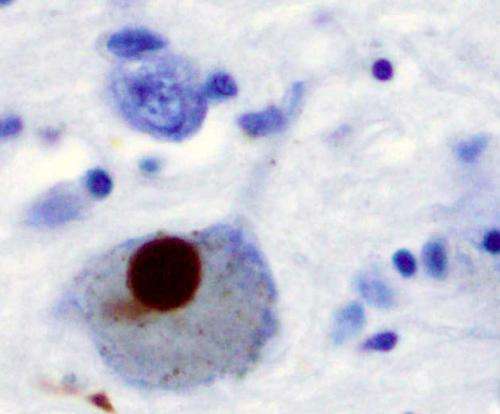Medical history can point to earlier Parkinson's disease diagnosis

Before symptoms become pronounced, there is no reliable way to identify who is on track to develop Parkinson's disease, a debilitating movement disorder characterized by tremors, slowness of movement, stiffness, and difficulty with balance and coordination.
But researchers at Washington University School of Medicine in St. Louis have analyzed Medicare claims data of more than 200,000 people to develop an algorithm to predict whether a patient one day will be diagnosed with Parkinson's. The algorithm relies on information in patients' medical records, such as tests and diagnoses of various medical conditions.
"Using this algorithm, electronic medical records could be scanned and physicians could be alerted to the potential that their patients may need to be evaluated for Parkinson's disease," said Brad A. Racette, MD, the Robert Allan Finke Professor of Neurology and the study's senior author. "One of the most interesting findings is that people who are going to develop Parkinson's have medical histories that are notably different from those who don't develop the disease. This suggests there are lifelong differences that may permit identification of those likely to develop the disease decades before onset."
The study is available online in the journal Neurology.
An estimated 1 million people in the United States live with Parkinson's disease, a chronic and progressive neurological disorder.
Recognizing that the mild but worsening symptoms in the years before diagnosis might be reflected in a signature pattern of various diagnoses and tests, Racette and colleagues analyzed de-identified medical claims data for Medicare beneficiaries nationwide, ages 66 to 90.
They found 89,790 people who had been diagnosed with Parkinson's in 2009, and matched them with 118,095 people in the same age range who had not been diagnosed with Parkinson's in 2009 or prior years. Then, the researchers sifted through each person's claims history to draw up a list of all diagnoses received and medical procedures undergone from 2004 to 2009.
Racette and colleagues developed an algorithm using medical history – combined with age, sex, race or ethnicity, and history of tobacco smoking – that correctly identified 73 percent of the people who would be diagnosed with the disease in 2009, and 83 percent of the people who would not.
Specifically, many of the claims codes that helped predict the disease referred to problems already known to be associated with Parkinson's such as tremors, posture abnormalities, psychiatric or cognitive dysfunction, gastrointestinal problems, sleep disturbances, fatigue and trauma, including falls. Other factors associated with the disease included weight loss and multiple forms of chronic kidney disease.
Factors that indicated Parkinson's was unlikely included obesity-related conditions, history of tobacco smoking, cancer, cardiovascular disease, gout, allergy and injuries related to physical activity such as hip replacement, osteoarthritis and carpal tunnel syndrome.
"We want to be able to catch people as early as possible," Racette said. "If I know someone may be in the beginning stages of Parkinson's disease, I would evaluate their gait and balance to determine if they have unrecognized impairments that could lead to falls, or whether they have difficulty performing activities of daily living. Either of these scenarios may benefit from treatment."
In the 18 months before diagnosis, people eventually diagnosed with Parkinson's endured a flurry of doctor's visits and medical tests. Most likely, their symptoms were worsening, and their doctors were running test after test, looking for the cause, said Racette. Using this algorithm potentially could help reduce unnecessary tests and speed the process of diagnosis, he said.
More information: Susan Searles Nielsen et al. A predictive model to identify Parkinson disease from administrative claims data, Neurology (2017). DOI: 10.1212/WNL.0000000000004536

















